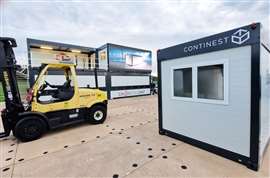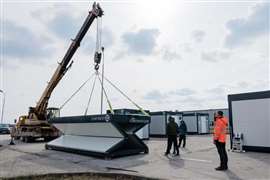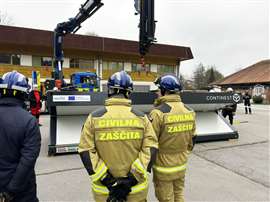Interview: Continest eyes growth for its foldable containers
03 February 2025
Continest Technologies Plc, a Hungary-based supplier of ‘foldable or flatpack’ portable containers, is growing fast and is making equipment rental a part of its strategy. Rental Briefing reports.
Whenever a manufacturer steps into the rental market, there are always questions about competing with rental company customers, but Tamás Turza, manager of international rentals at Continest, says there is no conflict.
“Our business model for rentals is more about leveraging a network of our existing customers because we have incredibly strong ties and very good and friendly relationships with them,” he tells IRN in an exclusive interview. “Obviously, we would never want to swoop in on their markets or snatch business opportunities from them.
“We are trying to get our closest or most relevant partners involved and bringing the business to them,” Turza says. “We aim at larger events that would be difficult for us to undertake individually.”
The main distinguishing feature of the company’s cabins is their ease of transport and speed of erection. A team of three people can move a standard 20ft Continest container from a truck to the ground and raise it within seven minutes. (Turza prefers the description ‘foldable’ to ‘flatpack’ because he thinks the latter sounds like a lot of time-consuming work.)
The business is heavily reliant on the events sector and typically sees a big rise in demand starting in May, peaking in July, and then reducing into the Autumn, related. “And in this period”, he says, “everybody’s helping out everybody, and it’s never as clear cut as one vendor for one event.”
He says Continest - which was founded as recently as 2019 - can supplement its customers’ fleets with its units in the peak season as “nobody has enough units ever.”
 Continent’s containers can be used at events and on construction sites. (Photo: Continent)
Continent’s containers can be used at events and on construction sites. (Photo: Continent)
“You can have 500 units in your area of business, and it’s still not enough. So it’s important to manage the flow of these units across all the parties and all the opportunities instead of just slicing them up as who does what festival. It’s a very organic thing. And obviously, we thrive to be an operational part of that organic growth.”
He says that by strengthening its ties with customers through a kind of wholesale rental, Continest will be able to sell more containers over the long run.
Construction sector
Continest will offer three core products: CN10, CN20, and CN Retail Unit.
The CN10 is a 10ft long foldable booth, while the CN20 is 20ft long. The CN Retail Unit is similar to the CN20, but multiple units can be joined together along either the long or the short sides.
Last year, the company sold more than 600 containers in Europe and North America, with the construction industry making up less than 10% of its customer base. It has now set aside 160 to 170 units for its rental customers, mainly from the event sector.
“We are very well represented in the construction sector around the world, but not on the rental side,” Turza says.
“It doesn’t mean that we don’t aim for construction projects. In fact, we do have quite a few conversations open, but construction is a bit of a weird beast.
“We’ve seen scenarios before where customers in the construction sector purchased our units. They put them down on a construction site for 10 months and never moved them anywhere. And then, they wondered why the return on their investment was not coming back. It’s because they were not moving the units.”
He says that while Continest’s containers are easy to transport and relocate, they are more expensive than fixed-frame units. He says customers can increase their return on investment only if they have to move the units frequently.
 It takes seven minutes to raise a Continest container. (Photo: Continest)
It takes seven minutes to raise a Continest container. (Photo: Continest)
“Fixed-frame containers may be cheaper”, he says, “but in order for the customer to have those containers delivered, the vendor or the renting party will have to add the price of delivery and the price of removal.
“We can deliver the same amount of our container units on a fraction of the logistic costs of the fixed frame units. That saves our clients a lot of money, which is very appealing.”
Development plan
Continest started its manufacturing business in Hungary, serving the European and North American markets. Last year, it opened a factory in North Carolina to better serve North America.
Turza says the company has a sales team of eight people in Hungary, who are responsible for retail worldwide, except in the US, where there is a dedicated sales team of four people.
“On the European side, it’s virtually just me and our director of strategy [Dániel Tegzes], who’s also one of the company’s owners. It’s the two of us against the world. We do have a vision, and we are laser-focused to get that vision through.”
The company will grow its team in Europe as it expands its business to rentals.
He says Continest’s key partners include the Norwegian branch of Renta, the fast-growing Nordic rental business which will supply units for an upcoming international ski event in Norway.
 In December 2024, Continest provided Slovenia with 160 foldable containers designed to enhance disaster response capabilities. (Photo: Continest)
In December 2024, Continest provided Slovenia with 160 foldable containers designed to enhance disaster response capabilities. (Photo: Continest)
Turza says the company has set up a small task force this year to focus on sales to government for applications in defence, humanitarian aid and natural disasters.
Last December, the company was awarded its first European Union civil protection project. In collaboration with the local government and the rescEU project, it provided Slovenia with 160 foldable containers designed to enhance disaster response capabilities.
Setback in the UK
Continest planned to allocate one-third of its rental containers to the UK market, where it sees strong demand.
The company is not new to the UK market but faced a setback when its UK partner, Cube Modular, went bankrupt in late 2023.
“2025 is the year of rebuilding our brand in the UK.” says Turza, “Hopefully, within a month, we will have a partner in the UK that we’re going to undertake some businesses with. But we’re not looking for another exclusive distributor again.”
He says it may take a little more time and effort to form partnerships overseas, but integrity is one of Continest’s key strengths and advantages.
The rental sector - both direct sales to rental customers and its own fledgling rental business - will play a part in the business strategy, but just as important will be acceptance across multiple sectors of the benefits of easy-to-transport and quick-to-erect containers. You could say, flatpack product, three-dimensional plan.
STAY CONNECTED



Receive the information you need when you need it through our world-leading magazines, newsletters and daily briefings.
CONNECT WITH THE TEAM







